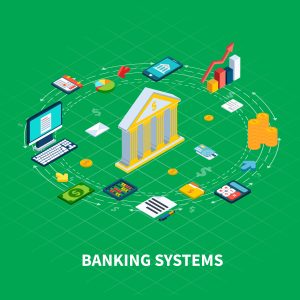Automation is always a hot topic, no matter the sector. It correlates with every banking process, but only a few financial institutions are getting the most from their chosen software. Let’s pull back the curtain to reveal the fascinating world of the “Tech Element” in banking processes.
Nearly 85% of banks have already adopted intelligent automation to expedite several core functions.
– Nanonets
That means many banks have adopted smart technologies to speed up various essential tasks within their departments. Manually handling tasks is a chapter they have closed. Automated processes are the new hands in the room, that make things quicker and more efficient, possibly involving tasks like transaction processing, paperwork handling, or other core functions. This shift towards automation is a significant trend in the banking industry, aiming to enhance speed and accuracy in daily operations.
Banking Processes Defined
Ever imagined how a financial institution came into existence? Well, financial institutions have a series of steps and activities going on behind the curtains. These activities enable them provide financial services to their customers.
What is Banking Automation?
 Banking automation is a means of digitalizing banking processes to minimize human involvement. It is the outcome of technological advancements, resulting in a constantly evolving financial industry. The ultimate result is far more efficient, trustworthy, and secure banking services.
Banking automation is a means of digitalizing banking processes to minimize human involvement. It is the outcome of technological advancements, resulting in a constantly evolving financial industry. The ultimate result is far more efficient, trustworthy, and secure banking services.
As a financial institution, you must find a way to give your customers the experience they seek. That way, you will remain competitive in an already saturated industry, especially as virtual banking expands faster than we can imagine. Image Source
What are the Challenges for Financial Institutions Today?
While most of your peer institutions are embracing the digital shift, much work is still pending.
The reason?
Despite the many creative concepts and methods of simplifying banking tasks, the customer is still at the heart of it all. Your customers demand more, faster, and better outcomes. And they won’t be your die-hard fans if you don’t make the digital changes they need. If you cannot compete with institutions that can fulfill these requirements, you will likely crumble in the long run.
Take a look at some of the pressing automation challenges for most financial institutions today:
1. Difficulty Blending with Old Systems
Your institution could still be operating on older systems whose designers did not have automation in mind. That makes integrating modern systems with them extremely complex and costly, hindering the seamless flow of data and processes.
2. Evolving Security Concerns
Financial data is extremely sensitive, raising security concerns when blending with digital systems. As a financial institution, you must go the extra mile to ensure robust cybersecurity measures. Protecting customer information against data breaches or unauthorized access is a must.
3. Industry Compliance
The regulator’s eye is in every corner of your processes, and automating your banking processes is the only way to align with the strict standards. Thus, you must avoid any legal or financial consequences.
4. Customer Trust and Retention
Maintaining and building customer trust is no question. Automating your banking processes will reduce face-to-face interactions with your customers. That will undoubtedly impact the personal touch associated with traditional banking. Therefore, you must ensure effective communication about the benefits and security of the processes you automate.
5. Reduced Accuracy and Data Quality
All financial transactions are important, but it is only beneficial if the data processed is accurate and reliable. It is disastrous to process financial statements with inaccurate figures. Remember that automation heavily relies on accurate and high-quality data. Accurate data shows the financial reality of your business. Inconsistent or erroneous data can lead to flawed automated processes.
Therefore, if you’re thinking of automation, you must ensure the reliability and integrity of the information you process through automated systems.
6. Scalability Issues
Many financial institutions have gone under due to constant system downtimes. We’re talking of systems that are slow-performing, causing frustrations to customers and eventual exodus. Such cases result from the volume of transactions and data growth, which automation alone can resolve.
7. Costs of Implementation and Maintenance
While automation promises efficiency, the initial costs of implementing and maintaining new solutions can be substantial. Thus, you must carefully consider cost factors such as software licensing, training, and ongoing maintenance.
Navigating these challenges requires a strategic and holistic approach, where banks balance the benefits of automation with addressing potential pitfalls to ensure a successful and sustainable transformation.
Why Should You Automate Your Banking Processes?

Imagine your financial institution as a hub of various financial services. Now, you need automation across your institution’s departments to handle the multitude of tasks quickly, but efficiently.
Your institution processes countless transactions, queries, registrations, account updates, etc., every other minute. Automation steps in like a second eye, keen to quickly help your team perform repetitive tasks, like sorting documents or updating account details. This intervention not only saves you time but also ensures that you do everything accurately.
Think of it this way:
If you were to manually count and organize thousands of notes or coins, would it take you forever? And might there be mistakes? Well, that’s the kind of challenge an accountant in a traditional bank would be dealing with. But with automation, it’s like having a magical note/coin-counting machine that does it in a blink, and you can trust it to get the numbers right.
The whole idea of automation is to ensure everything runs smoothly. Your customers should get what they need faster, and your team can focus on more important things. It’s all about making the banking experience better, faster, and more reliable for everyone involved.
The Benefits of Automation in Detail
![]()
i. Speed and Efficiency
Speed is not an option but a necessity in banking. No customer wants to wait in some long queue to perform a simple task they could just do in minutes through a simplified process. Automation swiftly handles repetitive and time-consuming tasks, leading to a more agile and responsive finance operation.
ii. Error Reduction
Automation reduces the need for your team to spend more time on corrective actions, minimizing the risk of discrepancies.
Image Source
iii. Cost Savings
An automated system can easily handle routine tasks for you. This ensures you direct human resources to more strategic and value-added activities, reducing your operational costs.
iv. Enhanced Compliance
Strict adherence to regulatory requirements and internal policies is key. Automating your processes means you are reducing the risk of regulatory issues.
v. Scalability
Automated solutions are scalable. This scalability allows them to adapt to varying workloads and increasing volumes of operations without a proportional increase in manual effort.
As your institution handles larger volumes of operations, automation provides the flexibility and efficiency your systems need in handling increased workloads.
vi. Improved Data Accuracy and Visibility
Accurate and real-time data enables your teams to gain better insights into financial trends, aiding in informed decision-making.
vii. Streamlined Workflows
Automation streamlines operations by taking away repetitive tasks, improving efficiency and accuracy. This intervention enables your team to focus on tasks that require creativity, critical thinking and complex decision-making.
Which Aspect of Banking Can Automation Help In?
1. Account Opening and Onboarding
Such as identity verification, document submission, compliance checks, etc.
2. Transaction Processing
Such as fund transfers, bill payments, etc., ensuring accuracy and speed.
3. Customer Communications
For missed payments, account updates, alerts, and notifications to keep them informed about their financial activities.
4. Loan Origination and Approval
From application submission to credit scoring and approval, streamlining the lending process.
5. Risk Management and Compliance
Ensure good standing with the regulator by automating compliance checks and regulatory reporting.
6. Fraud Detection and Prevention
You can automate fraud detection to identify and prevent any fraudulent activities in real-time.
7. Credit Scoring and Decisioning
Automating credit scoring helps the credit department to assess the creditworthiness of borrowers and make informed lending decisions.
8. Account Reconciliation
Automate the reconciliation of accounts, ensuring accuracy and efficiency in matching transaction records.
9. Regulatory Reporting
Automate the generation and submission of regulatory reports to comply with financial regulations and reporting requirements.
10. Mobile and Online Banking Services
Convenience is key in mobile banking. And automated mobile and online banking services for your customers allows them to perform various transactions and access other services remotely. Your main focus should be the overall customer experience.
The Bottom Line
The era of automation is upon us all. Automation is not a choice. but as a strategic imperative. The benefits of streamlined workflows, efficiency, customer satisfaction, competition, etc., require you to take your financial institution to the next level.
Your Next Move Could Change the Future of Your Banking Services.
We’ve helped our clients save billions of dollars by automating debt collection, credit scoring, Account Reconciliation, improving core banking performance through channels management, and many more. To find out how we can help you automate your business:
Read our case studies, datasheets, and news.
Visit our solutions page to see how NLS Tech Solutions can help you improve efficiency in your banking processes.
Learn about us and our extensive experience of assisting financial institutions like yours.
BOOK A LIVE DEMO TODAY








